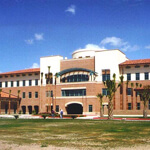
Francisco G. Cigarroa, M.D., president of the Health Science Center, honored representatives of the Robert J. Kleberg Jr. and Helen C. Kleberg Foundation at a reception/dinner Feb. 27 in McAllen, where he also saluted the outstanding resident physicians at the Regional Academic Health Center (RAHC) who are the 2005-2006 Kleberg Medical Scholars.
Ralph DeFronzo, M.D., professor of medicine and chief of the diabetes division at the Health Science Center, gave the keynote address on the diagnosis and management of diabetes.
The issues that most affect the Lower Rio Grande Valley are under study by internal medicine residents from the RAHC Medical Education Division, operated by the Health Science Center Medical School in Harlingen. This year, the 12 Kleberg Medical Scholars are conducting projects focusing on diabetes, streptococcus infection, nutrition/obesity, chest pain and more.
Their work is so outstanding and cutting edge that many of the Kleberg Medical Scholars have been invited to present at national meetings. Three Kleberg Scholars are headed for Philadelphia, Pa., in April to present research at the American College of Physicians Annual Session. The national contest is so competitive that only 50 of more than 1,300 clinical vignette posters submitted will be presented in Philadelphia, including two from Kleberg Scholars. Of 333 research abstracts submitted, only 30 will be presented at the national meeting, including one from a Kleberg Scholar.
When the Kleberg Foundation gave $1.46 million four years ago to establish the Kleberg Medical Scholars Program at the brand-new RAHC, trustees may not have dreamed that this much high-quality medical research could be supported so quickly.
Jennifer L. Gonzales, M.D., a Kleberg Medical Scholar from Cuero, Texas, is a third-year internal medicine resident at the RAHC Medical Education Division. Her 2005-2006 Kleberg-supported project focused on two extremely common foot problems in diabetics and the general population: fungal infections of the skin (tinea pedis) and the nail (onychomycosis).
Dr. Gonzales sees patients at the Su Clinica resident clinic in Harlingen, where diabetic patients have an annual foot exam to detect problems. “In this project, we’ve found that most of our patients have tinea pedis of the skin or onychomycosis of the nails. The nails get yellow, brittle and thickened. It’s very common. Both of these problems decrease the skin integrity, causing breaks, leading to complications such as foot ulcers or cellulitis (infection of the skin), which can lead to other complications such as amputations,” Dr. Gonzales said.
“We suspect 50 percent to 60 percent of diabetics have one or both of these conditions, based on the patients we’ve seen, although there is no literature to support whether diabetics get the infections more than non-diabetics. That’s what we’re trying to show. We do want physicians to be more aware that they need to treat these infections aggressively because of risk of future problems.”
Most of Dr. Gonzales’ patients are diabetic, female and at least 65. She has assessed more than 240 patients for the infections.
The study started July 1, 2005, at the start of the Health Science Center’s academic year. The results will be presented in June at a Kleberg Medical Scholars Symposium at the RAHC.
Dr. Gonzales is going to the American College of Physicians meeting in April to present the case of a young man who consistently tested negative for HIV, the AIDS virus, although “clinically we suspected he had it all along. A test of his viral load finally confirmed it,” she said. “This showed inability of the HIV screening test to detect the virus during the initial phase of HIV, called acute retroviral syndrome, which is the most contagious phase of HIV transmission.”
The Robert J. Kleberg Jr. and Helen C. Kleberg Foundation was incorporated in 1950 as a general purpose foundation to benefit Texas. Valley Baptist Medical Center in Harlingen assists the program as the primary inpatient teaching facility for the residents. Su Clinica is the primary ambulatory care teaching facility.

